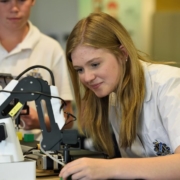Differences between UK and US university degrees
Making an application for any competitive university worldwide needs consideration, forethought and preparation. Normally this would be for a year or two before actually submitting your application.
- What do I want to study?
- Where do I want to study?
- Have I got the right qualifications; level, grades and subjects?
- How do I enrich my application?
- How important are my extra-curricular activities?
Applying to study in the UK can be very different to applying to study in the US. Students in the UK are admitted on their academic record. Studying is more intensive, it is likely that you will be applying for one subject and expected to study that subject for three years or more. There are combined subjects that you can apply for but generally there is less flexibility in the UK, so you need to be sure of your commitment and passion for the subject before you apply and definitely before you accept your offer and begin your studies!
US degrees offer flexibility, so students don’t need to be certain of their subject choices before they enter. It’s quite common for students to change their major in the first year and they may not have to commit to their course of study until part way through their four-year degree. Students studying in the US accumulate their grades through each module they take. They can take a break from their studies at strategic times and even move between faculties or institutions.
Entry requirements
Before you apply to the UK you will need to check the entry requirements and subjects. High ranking universities will expect you to have the equivalent to three A levels – grade requirements can vary, typically from A*AA to AAB/ABB. So, for instance an A*AA subject may require a US student to have a good High School Diploma with 3 APs plus one SAT subject scored at 720. Some degrees may require specific subjects to be studied beforehand. For instance Economics often requires students to have high level maths. Engineering will require Maths and Physics and Medicine will require Chemistry and often Biology. There may well be additional tests to take and you may need to register for these before the application is submitted so make sure you check all the requirements first.

It’s always a good idea to get ahead and start to think about enriching your application a year or two before you apply. In the UK most students are encouraged to do some kind of work experience. This is beneficial to gain an understanding of any careers and to skills and attributes before attending university. If you cannot get work experience, try voluntary work or do them both! Volunteering helps you to help the community and you gain skills and experience at the same time! Compassion, time management, communication skills, leadership, empathy, tolerance, patience and understanding are all valuable attributes to take with you to university. Enrichment activities can include some in-depth reading, (it’s important to go beyond the school curriculum), summer schools, debating events and conferences. Anything that can improve your confidence and help you to articulate your interests and passion for the subject.
Extra-curricular Activities
What about your extra-curricular activities? US institutions are more interested in your extra curricular activities. The UK view is that they are important for your health and wealth being – universities in the UK have excellent Student Unions offering sporting and social activities but Admissions Tutors are looking at your academic abilities rather than your sporting prowess. Your UK application should include a Personal Statement of which 75% is about your academic ability and 25% about your extra curricular. There are of course exceptions depending upon your course of study. Read more about differences between UK and US universities.
As qualified, experienced and expert university advisors, we offer a range of application support packages. Find out more.










